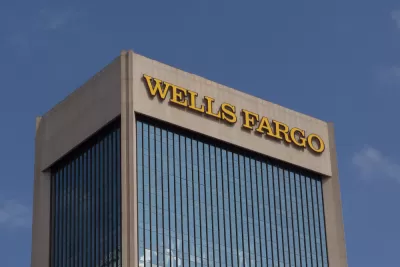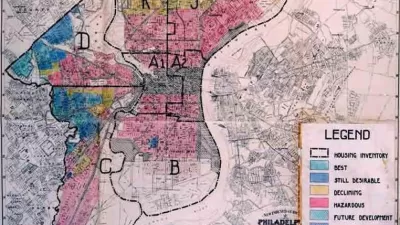According to a new report detailing discriminatory lending in Chicago, people in majority-white neighborhoods continue to receive more loans, and in greater amounts, than people in majority-Black and majority-Latino areas.

New analysis from WBEZ and City Bureau shows the massive disparity in lending to residents of white neighborhoods compared to residents of black and Latino neighborhoods in Chicago. Linda Lutton, Andrew Fan, and Alden Loury call the practice "Modern-day redlining," describing "a pattern that locks residents out of home ownership, deprives communities of desperately needed capital investment and threatens to exacerbate racial inequities between neighborhoods."
When WBEZ and nonprofit newsgroup City Bureau reviewed 168,859 home loans between 2012 and 2018 made by banks and non-bank mortgage companies, they found that of the $57.4 billion loaned, 68.1% of cash funded people in majority-white neighborhoods with only 8.1% going to majority-black neighborhoods and 8.7% ending up in majority-Latino neighborhoods. Their report notes that while higher home prices in majority-white neighborhoods can explain part of the imbalance, the fact that "financial institutions made four times more loans in Chicago’s white neighborhoods than they did in black or Latino areas" obviously points to a much larger problem.
According to the authors, injecting money into neighborhoods in the form of home loans is a fundamental way to impact the health of communities and the quality of life of its residents.
FULL STORY: Where Banks Don’t Lend

Planetizen Federal Action Tracker
A weekly monitor of how Trump’s orders and actions are impacting planners and planning in America.

San Francisco's School District Spent $105M To Build Affordable Housing for Teachers — And That's Just the Beginning
SFUSD joins a growing list of school districts using their land holdings to address housing affordability challenges faced by their own employees.

The Tiny, Adorable $7,000 Car Turning Japan Onto EVs
The single seat Mibot charges from a regular plug as quickly as an iPad, and is about half the price of an average EV.

As Trump Phases Out FEMA, Is It Time to Flee the Floodplains?
With less federal funding available for disaster relief efforts, the need to relocate at-risk communities is more urgent than ever.

With Protected Lanes, 460% More People Commute by Bike
For those needing more ammo, more data proving what we already knew is here.

In More Metros Than You’d Think, Suburbs are Now More Expensive Than the City
If you're moving to the burbs to save on square footage, data shows you should think again.
Urban Design for Planners 1: Software Tools
This six-course series explores essential urban design concepts using open source software and equips planners with the tools they need to participate fully in the urban design process.
Planning for Universal Design
Learn the tools for implementing Universal Design in planning regulations.
Smith Gee Studio
City of Charlotte
City of Camden Redevelopment Agency
City of Astoria
Transportation Research & Education Center (TREC) at Portland State University
US High Speed Rail Association
City of Camden Redevelopment Agency
Municipality of Princeton (NJ)





























